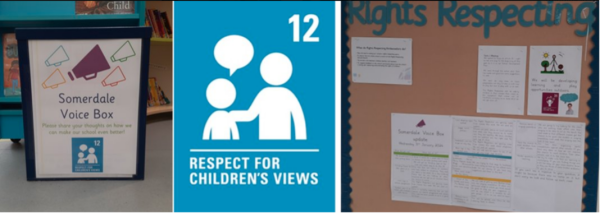Developing a culture of pupil leadership
Rights Respecting Team
Article 42 – Everyone must know children’s rights
Adult Lead: Sam O’Regan
As a UNICEF Gold Rights Respecting School the Rights Respecting Team play an integral part in raising the profile of children’s rights, in school, the community and beyond. The children go through an ethical recruitment process annually with two rights respecters per year group from Reception – Year 6. Children meet regularly and focus on rights and issues that affect children of the school. Previous campaigns have included inviting and speaking to the local MP regarding the rights of refugees, leading a project working with outside agencies to improve play and rest opportunities outside, and raising the profile of rights to our families as part of our journey to become a Gold Rights Respecting School.

Listening Team
Article 13 – Sharing Thoughts Freely. Article 12 – Respect for Children’s Views
Adult Lead: Alice Baker
The Listening Team are democratically elected by their class to represent their peers views at school council meetings. Two Listening Team members are elected per class. Each Listening Team member holds their position for a term of one year and meets with the Senior Leadership Team at least once per term. Their key function is to represent the views of their peers and to participate in local projects. The Listening Team also evaluate specific areas of the school development plan.
Anti-Bullying Ambassadors
Article 19 – Protection from Violence
Lead Adult: Beth Baker
The Anti-Bullying Ambassadors are a group of children who have applied voluntarily to support their peers to understand more about bullying and work towards creating a positive environment for all children. Each child has a month throughout the year where they are available during break and lunch times to help their peers to feel heard and seek further support if they need it. The Anti-Bullying Ambassadors also participate in termly meetings to discuss how we can continue to develop our whole school approach to Anti-Bullying, such as introducing our Anti-Bullying Charter.
Play Leaders
Article 31 – Every child has the right to rest, relax, play and to take part in cultural and creative activities.
Lead Adult: Jim McLaughlin
Play Leaders are voluntary activity instructors who organise and deliver a range of ‘play’ task and games during lunchtimes. The range of games and activities are suggested by all Somerdale children from conferencing conducted at the start of the school year. Activities are then organised into a diverse and balanced schedule throughout each term so that high intensity/competitive challenges such as ‘capture the flag’ are offered alongside calmer spaces such as origami folding.
Volunteer sign-up forms to become a Play Leader are then issued to every class from Year 2 to Year 6 for all children. All applicants are then organised in groups to lead one or more of their chosen activities that they have expressed an interest in leading. Play Leaders host their activity on a weekly basis around a rotating schedule of events throughout the week. They hold this position until the end of term when activities then change over.
The key function of Play Leaders is to promote healthy play, the spirit of competition and support our on-going ambition as a whole school to continue offering more opportunities for personal growth and physical literacy development.



